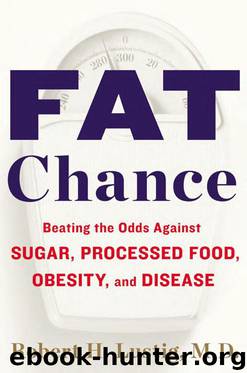Fat Chance: Beating the Odds Against Sugar, Processed Food, Obesity, and Disease by Lustig Robert H

Author:Lustig, Robert H. [Lustig, Robert H.]
Language: eng
Format: epub
ISBN: 9781101606582
Publisher: Hudson Street Press
Published: 2012-12-26T23:00:00+00:00
Contenders or Pretenders?
Many epidemiologic studies demonstrate correlations between low blood levels of antioxidants such as vitamin C and beta-carotene and the prevalence of metabolic syndrome. But are these micronutrient deficiencies the true cause of disease or just markers of an extremely bad diet? At this point, we just don’t know. We know that altering diet (eating more fruits and vegetables, limiting processed foods and sugar) to deliver more of these compounds is almost uniformly beneficial in improving the signs and symptoms of metabolic syndrome. But when these antioxidants are given as supplements, they usually fail miserably. This could very well be due to the beneficial effects of eating unprocessed foods, where you get both the fiber and the antioxidants as a bonus.
In clinical trials, vitamin E supplementation has flamed out not once but five separate times: (1) in the Alpha-Tocopherol, Beta-Carotene Cancer Prevention (ATBC) study, in which beta-carotene (the orange stuff in carrots and the precursor to vitamin A) and vitamin E given to heavy smokers increased their risk for cancer and ischemic heart disease; (2) in the Heart Outcomes Prevention Education (HOPE) Trial of 2005, in which vitamin E contributed to heart failure; (3) in the Women’s Health Initiative of 2005, in which ten years of vitamin E showed no benefit on heart disease or cancer; (4) in the Selenium and Vitamin E Cancer Prevention Trial (SELECT) of 2009, in which the vitamin E group increased their risk for prostate cancer; and (5) in a 2008 Cochrane meta-analysis, in which vitamin E did not alter the rate of cognitive decline.
The Iowa Women’s Health Study has provided the most recent stake through the heart for the dietary supplement movement.5 This long-term and well-controlled study showed slightly increased risk of death with several dietary supplements (particularly iron). Of all of them, the only long-term benefit was found by taking calcium, which improved longevity through fewer broken bones. But you never hear about these failures, because no agency publicizes them and there is no pressure to remove the supplements from the market.
This is a real dilemma. Micronutrients matter—the biochemistry says so—except they don’t work when provided as supplements in clinical trials. How many studies do we need? Now you’re ready for the dénouement: Real food, containing endogenous micronutrients, prevents metabolic syndrome. Processed food causes metabolic syndrome. And nutritional supplements can’t reverse that which has previously been destroyed.6 So why does real food work while supplements don’t?
Download
This site does not store any files on its server. We only index and link to content provided by other sites. Please contact the content providers to delete copyright contents if any and email us, we'll remove relevant links or contents immediately.
Good by S. Walden(2917)
The Social Psychology of Inequality by Unknown(2311)
0041152001443424520 .pdf by Unknown(2221)
The Checklist Manifesto by Atul Gawande(2205)
The Meaning of the Library by unknow(2069)
23:27 by H. L. Roberts(1893)
Guns, Germs and Steel by Diamond Jared(1885)
Being Mortal: Medicine and What Matters in the End by Atul Gawande(1806)
Borders by unknow(1786)
A Leg to Stand On by Oliver Sacks(1713)
The Hot Zone by Richard Preston(1632)
And the Band Played On by Randy Shilts(1615)
The Valachi Papers by Peter Maas(1516)
The Obesity Epidemic by Robyn Toomath(1421)
The Laws of Medicine by Siddhartha Mukherjee(1416)
The Andromeda Strain by Michael Crichton(1367)
The Plague and I by Betty Macdonald(1268)
Pharmacy Practice and The Law by Richard Abood(1254)
Autism's False Prophets by Paul A. Offit(1238)
